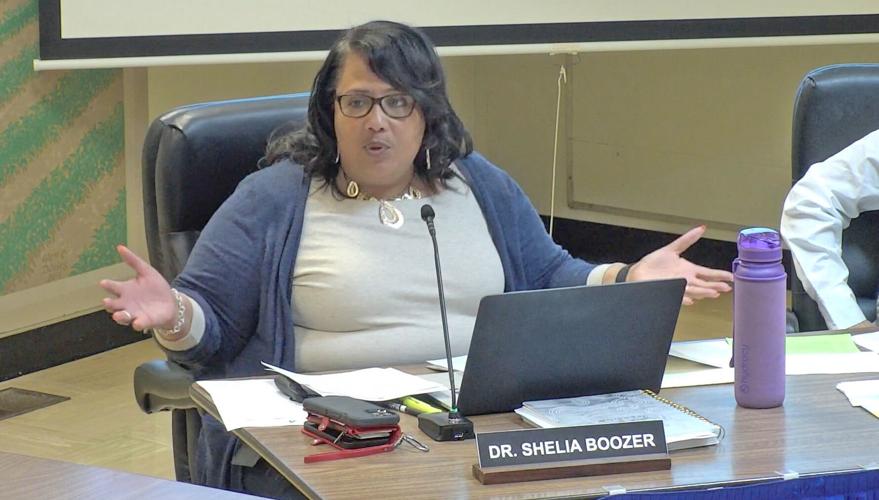
This story appeared in 'Meeting Minutes & More,' a weekly, six-page special section in the print editions of Friday's News-Gazette reported and written by Editor Jeff D'Alessio and designed by News Editor Joel Leizer. Click here to read an electronic version of this week's section. Click here to subscribe to The News-Gazette.
Likely on the way out: Unit 4’s elementary “schools of choice” model, which Superintendent Shelia Boozer this week summarized as a failed initiative that “resulted in little to no progress in decreasing minority group isolation, closing pervasive achievement gaps between White and Black students and increasing achievement rates for other historically underserved student groups, including multilingual learners and students with disabilities.”
Its replacement as the district tries to close the widening gap in socioeconomic status between its 12 elementaries: TBD. And a decision on when a new program will be picked — originally pegged for December — may not come until sometime after the holidays, we learned this week.
A month after the district’s $159,000 consultant unveiled its first round of recommendations, here are 20 things we now know — and don’t know — about the particulars, the process and the people involved.
1. An email sent this week from The News-Gazette to Cooperative Strategies’ Ohio-based point person on the Unit 4 project came back with an automatic reply noting “Scott Leopold is no longer with Cooperative Strategies, LLC.”

Scott Leopold
Asked how his departure from the firm, after 17 years, would affect the district’s plans, Unit 4’s Stacey Moore said: “Mr. Leopold is still the lead on this project until the district’s decision is finalized.”
According to his LinkedIn page, Leopold is now director of planning for HPM, a strategic management services company based in Birmingham, Ala.

David Sturtz
2. As of mid-week, Cooperative Strategies‘ seven-question community survey had been filled out 2,359 times, Executive Director David Sturtz told the N-G. More than 500 community members registered for CS-led focus groups, though Sturtz acknowledged, “less attended.”
3. Will the consulting firm share the raw, anonymized results of that survey data with the community that submitted it? That’s what Unit 4 Families for a Smarter Solution co-founder Tony Bruno said he asked a CS official following a focus group he attended last week.

Tony Bruno addresses the school board during public comment.
“He said, ‘We could do that. That’s easy,’” Bruno told the school board during public comment this week. “But I said, ‘Will you do that?’ And he said, ‘Yes, we will.’ So my request is: You support these consultants” and make that data public.
4. Up to now, Unit 4’s project timeline called for CS to present focus group feedback and recommendations to the school board in November, with a board vote to follow in December. But Boozer indicated at this week’s meeting that the schedule may need to be tweaked, saying: “I’m not sure about a final recommendation at that point in time but there will definitely be some feedback and things for you to consider.”
5. An expanded timeline sounds inevitable, with Boozer saying, in between the firm making its recommendations and the board voting, the district wants to “definitely present those to our families and say, ‘Hey, here’s where we’re landing now. Give us some feedback on those.’”
6. Given that the new month starts in four days, Boozer said in response to a question from board member Chris Kloeppel, “I don’t know whether we’re going to be able to do that in November. I’m just being honest and transparent, because we want to do this right …”
Kloeppel: “We might be pushing our timeline in that we’re not necessarily looking at a December (vote) …”
Boozer: “Exactly.”
7. Board President Amy Armstrong: “This is a long, arduous process. And it’s OK to take our time. And it’s OK to change timelines. And it’s OK to have different plans. And it will all come forward.”

Chris Kloeppel
8. Something else to consider, courtesy Kloeppel: The process of reserving 2023 vacation days is under way for some staff members at one of the county’s largest employers, Carle. A district decision on whether the two elementary schools that currently operate on a balanced calendar — Barkstall and Kenwood — will switch to a traditional schedule would sure help those families plan ahead.
9. Asked this week about Cooperative Strategies’ process between now and recommendation time, Sturtz told us: “We do consider recommendations that emerge from the community engagements, not just those options that we had going into such surveys and meetings. We are exploring additional strategies based upon the feedback provided by the community to date and have several people from our company assisting with processing the feedback.”
10. If she’s said it once, Boozer has said it a dozen times: “Cooperative Strategies was hired to balance our schools, not to address achievement,” she repeated at this week’s board meeting. “That is my job, my cabinet’s job, my teachers, my principals. Those things are addressed in the classroom, where instruction happens.”

‘We do not want this huge disruption,’ Shelia Boozer said of changes to Unit 4’s elementary selection process.
11. The achievement gap was also addressed during Boozer’s presentation this week about Unit 4’s 2020-25 strategic plan (“essential aim: to improve student achievement of Black students in Champaign”); in her first letter to families about the need for change (in 2018-19, 9 percent of Black students were considered proficient in English language arts, 6 percent in math) and in the “performance and improvement goals” section of Boozer’s revised contract, which was signed this week. The particulars of the deal — a two-year extension (through 2026) with a 4.5 percent raise (to $221,000) — were released in September, but the goals weren’t made known until this week.
12. No. 1 on the list of five goals: Student achievement, as measured by seven indicators, the final one being “increase in student academic performance.”
13. In a response that drew pushback from a few attendees of this week’s meeting, Boozer spoke to the 90 percent figure cited by Cooperative Strategies as the number of elementary students who could be in a new school come fall 2023 if Unit 4 adopted one of two early recommendations from the firm:
“It was never the board that said ‘these are the scenarios we’re going to choose from.’ These are the scenarios that they recommended to start the conversation and then with all the feedback coming in, additional scenarios will come up.” And they have, she added, calling some of the alternative ideas to emerge from community conversations “phenomenal” ones.
14. Boozer even hinted that the model the district ultimately chooses might be one that’s staggered over time, recalling a conversation she’d had at the end of last week with the consulting firm: “I said … ‘how do we make sure we do this in phases if need be? Or the least disruptive?’ I’ve made it clear: We do not want this huge disruption. We don’t want it. So they’re looking at how to create those scenarios.”
15. Not surprisingly, the eight community members who spoke during public comment didn’t wait two-and-a-half hours to talk about the success of the Youth Employment Services program or the decision to raise substitute administrator pay from $350 to $400 a day, two of the meeting’s other agenda items.
16. Public comments ranged from Savoy village board member Jan Carter Niccum reminding the room that Unit 4 is a three-community district that also includes Bondville and his village, which “is not segregated,” to one-time school board candidate Lee McDonald taking issue with a comment from a previous meeting about the desire to desegregate Champaign: “With all due respect, I would argue that desegregating a city of 88,000-plus people is simply not your problem.”
17. Among the others offering their perspective in three minutes or less was Melissa Hines Shungu, a Unit 4 alumna, mom and employee who opened by professing her love of teaching first grade at the “diverse and vibrant community” that is Kenwood Elementary.
She said: “As is often the case with these type of proposals for systemic change, racial and class tensions in our community have bubbled to the surface. I’ve heard a number of polarizing narratives that I’d like to touch on and share an alternative perspective.
“First of all, it is a false premise to say that in order for systemic change to occur, our children’s sense of security, connection and social and emotional wellbeing must be sacrificed. We are a group of intelligent and creative adults, and we can craft a better system without sacrificing our children’s wellbeing.
“Secondly, I’ve heard the dismissive and polarizing argument — I’m not saying from you (motioning to the board), I’m just saying in the community at large — ‘Of course, privileged White people in our community won’t want change because their children are doing fine.’ The truth is, parents across races and classes want stability for our children. This is about parents not wanting to disrupt their children’s education and sense of connection.
“Also, as an educator, I can assure you that children who have experienced trauma, unpredictability and instability outside of school — who see school as their safe, predictable place — will suffer the most if either scenario is implemented next year and they are forced to leave their community.
“Finally, I’ve heard the argument ‘something must be done to desegregate our schools and if you’re against change, you’re against integration.’ Again, false dichotomy. We do not need to sacrifice our children’s wellbeing to achieve our diversity goals.
“The truth is, most of our elementary schools are close to our target SES percentages and would not change significantly in either scenario, according to the numbers I have seen at least, shared by Cooperative Strategies. Our school choice model may need to be revamped for various reasons but number-wise, most of our schools are near or meeting diversity goals.
“So let’s tackle the actual issue, as you’ve mentioned today: It does not matter how socioeconomically and racially diverse a school is if our most marginalized students are not demonstrating success in school. That is a problem. That is a case across our district — that Black children are underperforming even at the best-resourced schools, so moving them around is not going to address this issue.
“As an educator and mother of children of color, I know this is the issue that must be at the forefront, and I know you agree.
“In conclusion, we must value relationships. We know that’s at the heart of teaching and learning. So let’s craft a plan that meets our goals while maintaining a sense of community we worked hard to establish.”
18. School board members were also given an opportunity to weigh in, with Boozer soliciting questions they had that she said she’d share with the consultant. Among the topics that came up: the effect of scenarios on transportation, what building principals thought and how many members of underserved communities had been afforded a chance to be heard.

Kathy Shannon
19. And this from Kathy Shannon, who recently announced plans to run for a 2023 seat on Champaign’s city council: “I know there are ways to quantify the segregation of the city by census tract. If that is something in (Cooperative Strategies’) wheelhouse, I would really be interested in seeing how segregated our city is. Can we actually put a number to that, and can we think about what that is doing to our schools?”
20. Saying she felt compelled to speak up despite her past words being used against her and taken out of context, Gianina Baker closed this week’s meeting with a call for critics to be part of the solution.
Among her points:

Gianina Baker
— “I heard earlier ‘children are not an experiment.’ I continue to hear that, and I agree that children are not an experiment. I have three of my own. However, public education is and we continue to try and figure this out.”
— Champaign is “distinct” and has the opportunity and right people in place to “figure out a plan to move forward,” a model for other cities like this one.
— Rather than sending “20-page dissertation emails” picking things apart, “come with solutions. We’ve asked that so many times. Come with solutions.”
— As she heard Central High Principal Joe Williams say at a Community Coalition meeting, “assume positive intent” of the seven volunteers who make up the school board. “I know that people care. I know that we all want what’s best for our kid. But we’re up here thinking about what’s best for all of our students.”
— “I can’t look at that data” addressed in the district’s strategic plan “any more and not do something about it because my kids are part of that Black student percentage, one way or another. It is extremely harmful. It is absolutely traumatizing. But I think, and I hope, what we’re trying to do is to heal, with a plan, with us making a decision around schools of choice, with us really committing to solving pieces of this.”
“I’m not working to create chaos. I’m working to dismantle systems. And if you think that chaos equals dismantling systems, then so be it. But that is not what we are trying to do.”























